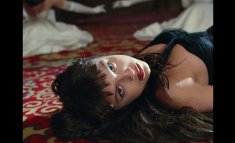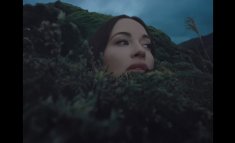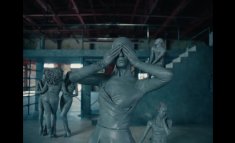Director/photographer David LaChapelle filed a lawsuit this week alleging that the new Rihanna "S&M" video directed by Melina Matsoukas infringed upon his copywrited photography work.
RadarOnline has the lawsuit available as a pdf here, if you're interested. And you should be interested, especially since the suit lays out lots of little details about the video-making process that usually stays behind closed doors.
Without getting into the weeds and comparing/contrasting stills from the videos with LaChapelle's work — since I think that's the least interesting angle to all of this — the lawsuit poses a direct challenge to how many music videos are formulated.
A large number of music videos are derivative works, but in the same way that lots of music itself derives from common sources. Music Videos often riff upon movies, photographs, works of art, commercials and so much more. Sometimes it's blatant, sometimes it's clearly parodic, sometimes it's elevated into something totally new. Whatever the case, there's often an inspiration that can be traced back to an existing source and this has occasionally led to sticky legal issues, which LaChapelle of course knows very well.
In 2003 LaChapelle directed a video for Jennifer Lopez "I'm Glad" that was a clear homage to Flashdance, recreating several of that film's most famouse dance sequences. There was no lawsuit filed over it, but a licensing agreement was apparently reached between Paramount, which produced Flashdance, and Sony, which commissioned the music video for its artist, Lopez. Some of these details can be gleamed from an unsuccessful legal claim by Maureen Marder, the real-life person who apparently inspired Flashdance and who signed away her story rights for $2,300. (See how easy it is to get in the weeds when you start thinking about this kind of stuff?)
The money quote over all this is provided by TV/Film critic Stephanie Zacherek, who in a must-read 2003 NY Times article about the Lopez/Flashdance situation wrote:
"''Flashdance'' seems worthless today as anything other than a cultural artifact. And yet Ms. Lopez and her director, David LaChapelle, have lifted it out of its tired context."
The relevance of that Flashdance experience is that I think we can safely assume LaChapelle has clearly had to think about these issues of inspiration as they relate to copyright, and where the line is between inspiration and infringement. And as Zacherk goes on to state in her article, it's hazy. There's always the questions of context and intent. And I think those are the questions that directors and record labels and production companies should keep in mind as they continue, as they clearly will, to use outside inspirations as the basis of music videos...













Comments